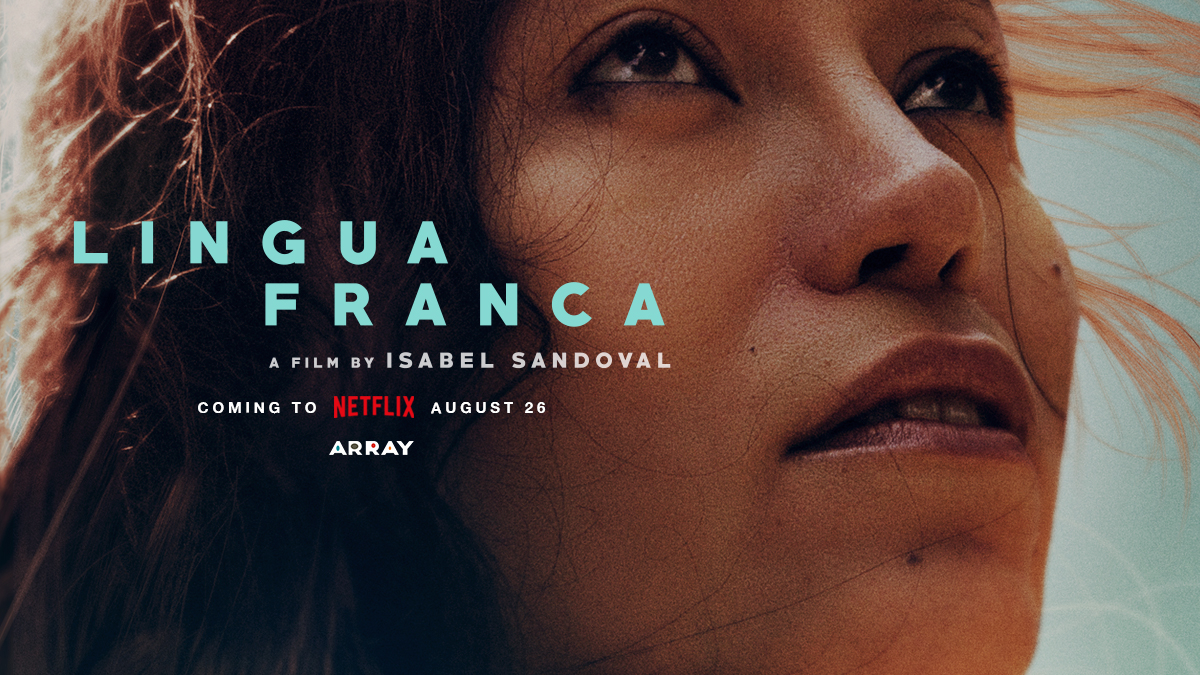Written By: Demi Guo
Isabel Sandoval resurfaces in the film world with a narrative that has become all-too-familiar: The story of an undocumented worker in the time of ICE. As the director and the main lead, she makes the experience as authentic to herself as she can — through the eyes of Olivia, who is a transgender Filipina woman.
“Lingua Franca” premiered at the 2019 Venice International Film Festival, making it the first film starring and directed by a trans person of color to be showcased there.
As novel as this representation is in many spaces, Sandoval makes it very clear that this narrative is not. It is resilient, and so are the characters. An audience new to Olivia’s world stops and watches, and then moves on with their lives; for those of trans and Asian identity, living in the reality of anti-immigration law, Olivia’s world is their lives.
It begins on a shot of the subway driving over a suspended bridge in Brighton Beach, Brooklyn. Olivia makes a call in the dark of her room, speaking to her mother back in the Philippines. The shots are spliced together and shot with terrifyingly precise lightning — often, the characters are little more than silhouettes — to create a sense of transience.
Olivia lives in a world boxed into her home, surrounded by news stories declaring Donald Trump’s anti-immigrant rhetoric at every corner, knowing she is not welcome in this country. She claws for documentation, paying for a green card marriage even while sending funds back to her mother. She is living on borrowed time and a constant sense of fear. She is hit with the unexpected throughout the story — but is it really unexpected if she knows even her existence in the country isn’t guaranteed? She could be caught by ICE and deported at any moment. Yet still, she does not forget to live.
She laughs, she cries, she waxes poetic and shares secrets and memories with her best friend. As you watch, there is a profound sense of watching a human you know and care for, and still being deeply rooted in reality.
“I think this kind of complex storytelling with trans films is so rare,” said Anoushka Ratnarajah in an interview with Georgia Straight. Ratnarajah is the artistic director of the Vancouver Queer Film Festival, where the film was also screened. “And while that character’s identity and being trans is part of the story, it’s not the most important part of the story. She gets to have other experiences.”
The film was bought by Array Releasing, a distributor founded by Ava DuVernay.
“The release of Isabel Sandoval’s third film is beautifully timed to enter the national conversation at an unprecedented moment of cultural reckoning for many, especially as it relates to the rights and dignity of trans people around the world,” said Array president Tilane Jones in an interview with Variety. “Ms. Sandoval’s introspective lens provides a depth and intimacy to her storytelling that is rarely embraced on screen.”
The shots are cut long, and many scenes are slow. In one instance, a shot was held still for so long, I had to check to see if the stream hadn’t somehow frozen. But you can’t look away.
On top of the seamless color palettes and soft lighting, the audio only speaks when it needs to. Olivia’s Tagalog accent, Olga’s — the elderly woman under her care — East European accent and Alex’s — Olga’s barely-employed grandson — old Brooklyn accent create a tricolored picture of their corner of Brooklyn. Olivia never raises her voice, but is pragmatic and purposeful in everything she does, even when she is tired or frustrated. Olga (the late Lynn Cohen), without changing her facial expressions, goes through stages of confusion, pettishness and reassurance. Alex (Eamon Farren) speaks loud and aggressive, except when he is with Olivia.
“Why don’t you just become legal?” Alex asks, out of genuine concern, and I burst out laughing. Without being a migrant worker, or trans, or Filipino, that is the big inside joke that really shouldn’t be inside: That the immigration system in the United States is a catch-22 of obtaining documentation, and migrant workers are stuck in the middle of it. We’re tired of saying it to the rest of America. Let’s put it on a screen, so they have a recording to refer to.
So while we wheel through shots of Coney Island and the Brighton Beach subway stop, knowing that at any moment, this could end, one thing is certain: Olivia will always find a new job if her current one does not work out and make money for her mother, and she will not give up. Most of all, she will not lose her right to being a human being.
The film closes in a way that leaves me winded and indignant. It also leaves me respecting the character, because she never stops giving love to her best friend and mother. She never stops giving love to those who deserve it. She never stops having a sense of pride, and though she speaks openly about the vicissitudes she faces because of her race, immigration status and gender, the actions she takes tell us that she will not abandon any of those aspects of herself either. I respect her, because she respects herself.
“Lingua Franca” starts streaming on Netflix on August 26th.

